‘Captain America: Civil War’ Directors Joe & Anthony Russo On Their Strange Road To Marvel Mavens – Deadline Q&A

EXCLUSIVE: Captain America: Civil War directors Joe and Anthony Russo are the new kings of Marvel, where they follow their second film built on Chris Evans’ red, white and blue shield with back-to-back installments of The Avengers, the blockbuster series started by Joss Whedon. These two brothers are a long way from Cleveland, where they grew up idolizing Truffaut, and took the most unlikely path possible to the top of the tentpole business. The siblings have worked so long together, they finish each other’s sentences like an old married couple. They sat with Deadline the day after an exuberant Hollywood premiere, right before they flew to China to launch Civil War in the Middle Kingdom. The film, which pits Marvel’s most popular superhero characters against one another, crushed it worldwide this week. It opens stateside tomorrow.
DEADLINE: The mix of action, drama and humor in your movie was so exhilarating it bothered me, seeing a still photo of Joseph, playing a character who was murdered in a bathtub. After all, you set yourselves up so well here for two Avengers movies you have to make. Did the two of you fight over who got to play the stiff?
ANTHONY RUSSO: No. I don’t like to get in front of the camera. Joe is a trained actor, you know.
JOSEPH RUSSO: I played one of the lead characters in Pieces, which was our first movie. Once Steven Soderbergh discovered us, it became an option of focusing on the directing career and not worrying about the acting career. I like acting a lot, but it’s not something I get out of bed for every day. So I started doing it as a joke, early on. Our dad, in the early ’70s, used to wear those gold-rimmed glasses, and had a big thick mustache. When I put the glasses on and the mustache, I look a lot like him. So, over the years, I’ve appeared as this gold-rimmed glasses character in a few of our…
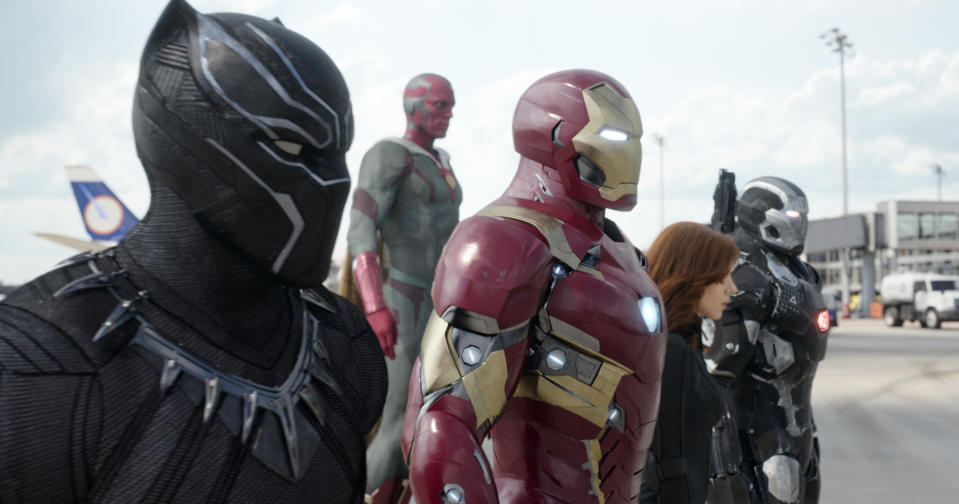
DEADLINE: So you have an alter ego?
JOSEPH RUSSO: I call it…damn, I don’t think we put it in the credits on this film, I forgot. Gozie Agbo is the name. We created him for a comedy sketch we did years ago.
ANTHONY RUSSO: We pulled the name out of the phone book.
JOSEPH RUSSO: I completely forgot to add it in the credits list.
ANTHONY RUSSO: Does it say Joe Russo in the credits?
JOSEPH RUSSO: I don’t know. Maybe I was uncredited. But typically, it’s Gozie Agbo.
DEADLINE: There are so many superhero movies, it’s hard to distinguish. You guys shoot these action sequences where it almost hurts, every time someone gets punched or flung into a building. What’s the secret sauce to making the audience feel that?
ANTHONY RUSSO: We work with our editor. And we’ve done our job if we’re constantly going “Oh, ow, ugh.”
JOSEPH RUSSO: It’s a combination of techniques, which we won’t elaborate on, lest somebody else…
ANTHONY RUSSO: Steal it.
JOSEPH RUSSO: Some of it is in camera, and some comes from our stunt team including a lot of really tough, exceptional stuntmen. Who take a lot of hits. It’s a very physical and that’s probably the largest part of the secret sauce. They take those hits. It’s a mentality that that department has, striving for realism. We have to give them incredible credit for the pain they endure to bring storytelling to the screen for general audiences. And some of it, we do a little tweaking in post. If a hit hasn’t landed perfectly but we like the shot, then we use visual effects to supplement.
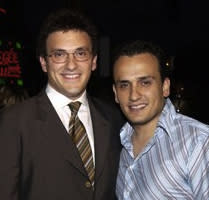
DEADLINE: What was the hardest scene to do that you were most proud of here? There is such frantic action going on between so many characters, and yet you never lose your sense of navigation.
ANTHONY RUSSO: It would be the airport scene. Because there’s so many characters involved. Here’s what’s complex about that sequence. Number one, the number of characters. So you’ve got an over-arcing story that you’re telling in that sequence where it’s one side versus the other, but then you’ve got individual stories you’re telling, about every character. Joe and I always say that our guide through action is always story and character. We’re always driving right at the character beats, or else the action beat doesn’t work. So it’s dealing with that number of characters, the number of sub-stories playing out of that sequence. And then on a physical level, the execution is very hard because it’s set at an airport. We did a little bit of shooting at Leipzig Airport in Germany, but most of it in Atlanta on a big slab of concrete with green screen all around it. Some of the characters were there, some are CG. We had to use so many different techniques to realize that sequence. Some of the what you see is our classic hand-to-hand stuff, and some of it is a mile away from that classic hand-to-hand stuff. This was almost like shooting a mini movie, that sequence. We prepped it for months, everybody on our team knew that was the centerpiece of the movie, and what our expectations of that sequence would be, and that we had to just keep bettering it, and bettering it. That was the process.
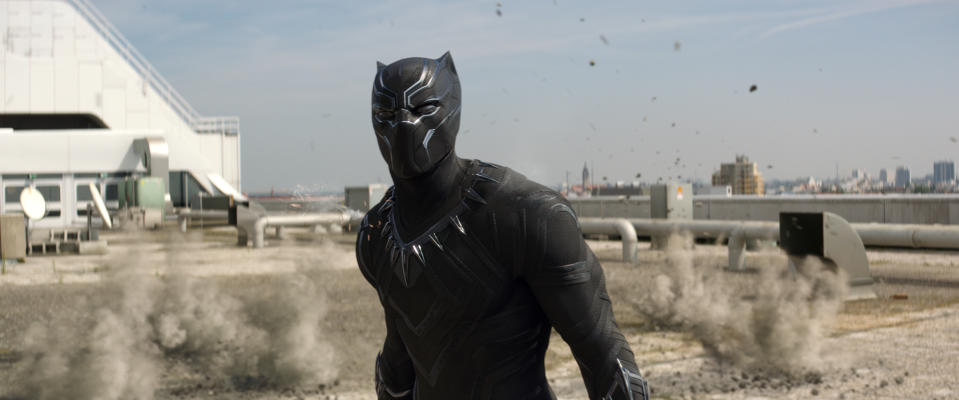
DEADLINE: Marvel tells you, we need you to introduce Black Panther, so Ryan Coogler can go make a spinoff movie with Chadwick Boseman. And then we’ve got the new iteration of Spider-Man, that will launch another franchises with Jon Watts directing Tom Holland. Also, we want to continue building Ant-Man with Paul Rudd. Add that to Robert Downey Jr’s Iron Man, Chris Evans’ Captain America, Sebastian Stan’s Winter Soldier, Scarlett Johansson’s Black Widow, Anthony Mackie’s Falcon, Jeremy Renner’s Hawkeye, Paul Bettany’s Vision and Elizabeth Olsen’s Scarlet Witch. That is a lot of character choreography to keep straight. How concerned were you this was just going to be too much?
JOSEPH RUSSO: The great thing about Marvel is, it’s a sandbox, right? After Winter Soldier, when they approached us about doing a third Cap film, we set high ambitions for the movie. We wanted to do something that alters the cinematic universe again, and is a very cathartic viewing experience for the audience. Because one incredible thing about Marvel is the emotional investment that the audience has in the material has been built up over 10 years. There’s nothing else like that in movie history, where you have characters from different franchises interweaving into a main story line, all with a large affectionate section of the moviegoing audience caring about them.
As filmmakers, that’s juicy for us, because we can take them on an emotional ride then in a way that you can’t in a traditional story where everybody needs an introduction. The movie could never work if it was a film where each of those characters needed a traditional introduction. That would have been a disaster. It’s only in the Marvel universe we could’ve accomplished this kind of story. We went to Marvel after we landed on the Civil War concept. Once we started exploring the idea, it started to become very binary with the characters. Because The Avengers were just falling on one side or the other. There were no free radical characters that could complicate the storytelling. The other issue we were having was the tone was too consistently heavy. Once you invest in the stakes of the movie, it’s very difficult for those characters who are invested in those stakes to make light of anything in the film. Otherwise, the stakes become devalued. We went to Marvel, and we said we need to add some characters who have different points of view. Black Panther specifically, because we felt like he could be a free radical with a motivation that tied him to the plot, but had nothing to do with anything that the other characters were chasing.
ANTHONY RUSSO: We loved that idea, that he just didn’t care about this big, important issue at the center of the movie, which is one side versus the other.
JOSEPH RUSSO: The life and death stakes that drive the storytelling. Also then Ant-Man and Spider-Man. Neither was connected to the stakes of the plot, so they could allow us to have a tonal shift in the movie which would keep it from being…we like well-balanced filmmaking. Movies, in essence, are a commodity. You go to the theater. You pay it money. If you got kids, it’s going to cost you a lot of money. You want a well-rounded experience, especially from branded IP. If you can laugh, and cry, and be scared, and cheer, you’re getting more for your money than if you just laugh or if you just cry. Our intent was to dimensionalize the storytelling by introducing characters who could be lighter.
DEADLINE: Balancing those life and death stakes are these absurd random moments that happen with Bettany’s Vision, and the interplay between Mackie’s Falcon and Stan’s Winter Soldier, that are so funny they become as memorable as anything else in the film.
ANTHONY RUSSO: You know what, somebody else told me that last night, that same thing.
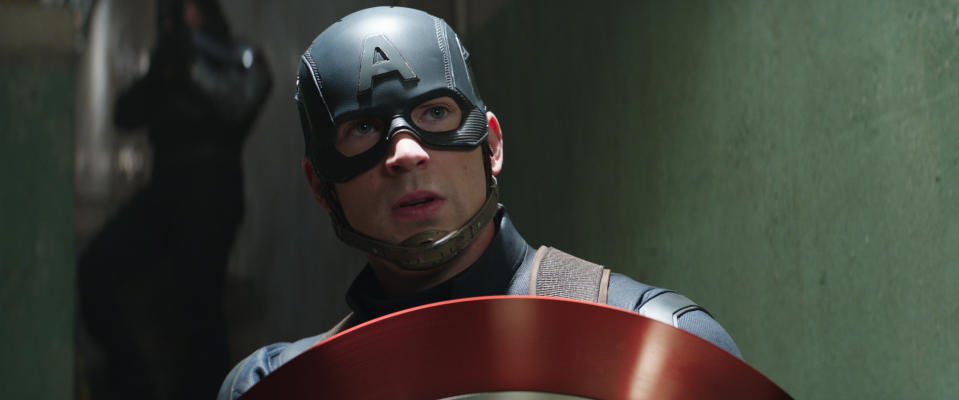
DEADLINE: I won’t spoil those moments here, but how do you know how far to go, to allow the audience to let off some of the tension, without compromising the seriousness? Do those moments happen spontaneously?
ANTHONY RUSSO: Some were scripted. On a structural level in storytelling, we find the audience gets a particularly kick out of a hard gear shift sometimes. So you’ve got Vision in the kitchen.
DEADLINE: Another laugh out loud moment.
ANTHONY RUSSO: It’s like you’re going from something really awful to something really light.
JOSEPH RUSSO: Contrast.
ANTHONY RUSSO: But because they’re in different contexts, they don’t seem disingenuous to one another. They seem like they can coexist. So I think that we got away with a lot of that because part of the story line was so dark in this movie, and part of it was so light. We got to slam back and forth. I think that’s why those moments, they’re almost like this tension relief where you get to the car with Falcon, Captain America and Winter Soldier, and something weird, goofball, and small happens.
DEADLINE: It’s a strength of Marvel storytelling that wasn’t part of Batman V Superman and its relentlessly serious tone. In Guardians of the Galaxy, Chris Pratt had numerous moments like that; In the first Avengers, Chris Hemsworth’s Thor says, ‘That’s my brother,’ and when the superheroes remind him Loki just killed 30 people, Thor adds, ‘Well, he’s adopted.” Does this consistent playful tone come from Marvel’s Kevin Feige?
JOSEPH RUSSO: We understand that that’s the formula. We worked in comedy for 15 years. Community was a genre-spoofing show that we executive produced. And Kevin saw these paintball episodes that we shot at the end of season two. And he thought, these guys should be doing action. It’s always a bonus with Kevin if you’re entertaining, as well. So the fact that we were doing comedy and that we could spoof action in a way that he could sense that we understood the genre, he brought us in and talked to us on Winter Soldier. I don’t think he knew that we were huge comic book fans or that we love political thrillers or that we would connect on so many other levels.
We developed a process over the years of shooting, where we have a very firm model that you can only make the movie out of what you bring into the edit room. You don’t got it, you can’t fix it, unless you go back and re-shoot it. And re-shoots are expensive. We work in digital and we don’t shut the camera off. We let it run. We’ll do multiple takes in a row because we don’t like the actors thinking too much. We give very succinct notes and there’s not a lot of discussion once we start rolling. Because you don’t build a performance from one take, you can build it from seven takes and layer that performance any way you want. You give small calibrations, so that the actors don’t get stuck in their head. You can give them small calibrative notes that guide them where you want them to go, slowly, over the course of six or seven takes.
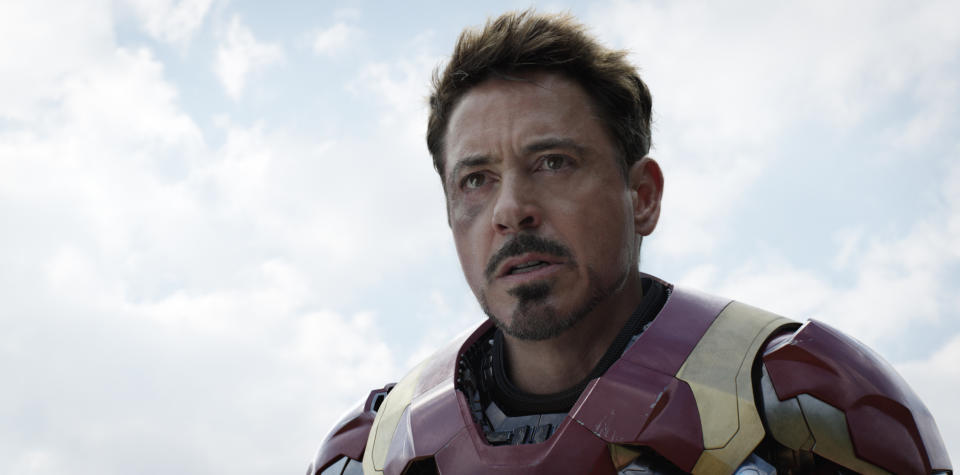
We also learned from the many times that we’ve been on set, shot a scene and went, boom, nailed it, and yet in the edit room, we go, wow, we fu*ked that scene up. So we’ve learned too to think about what other dimensionalizing do we want out of the performance. Is playing it too heavy? What if we lighten it up here? In combination with working toward dimensionalizing the emotive side of the performance, we also typically have lines that we want to play with. They can either be dramatic or comedic. We’ll shoot a lot of jokes that we take into the edit room, and then it all becomes about tonal modulation. But you have to have those things in your back pocket to be able to do that. We do vibe very well with Kevin on that front. We have very similar senses of humor.
ANTHONY RUSSO: Kevin does have an excellent sense of humor. He may not be very involved in crafting the comedic material, but we use him as a guide.
JOSEPH RUSSO: He’s a good sounding board.
DEADLINE: You worked for the first time with Robert Downey Jr here, Iron Man changed his life and established the Marvel universe. What’s the balancing act in making him feel these jokes don’t undermine what he has built?
ANTHONY RUSSO: It wasn’t a given that Downey was going to do Civil War. He wasn’t contracted, and so we had to go woo him.
DEADLINE: What’s that like?
ANTHONY RUSSO: It was a big deal. Once we convinced Kevin this was the right way to go, he said, okay, now you guys got to go get Downey. So we met with Downey, and Kevin came with us. It took a series of meetings, but things went well from the get-go, and we ended up spending an enormous amount of time with Downey on this movie. He’s a wonderful collaborator. Character is very important to him and he pours himself into it and he loves it. We use him as a guide, a lot. We had really radical ideas for the character which turned him on. I would say this. Clooney told us one time…when we made Welcome to Collinwood, Clooney played a small role in that movie to help us get it made. We were thanking him for taking the role and saying we were sorry it wasn’t a bigger role and he said, ‘are you kidding me?’ He goes, ‘the job of a leading man is to show up and let everybody else steal the scene. I get to steal the scene, here. This is great fun for me.’ I think Downey might’ve gotten that here. Cap had to carry the load of the arc, and Robert had the ability to go more off book than the character would normally go in a movie. Get darker, go to a stranger place. That really turned him on as a performer.
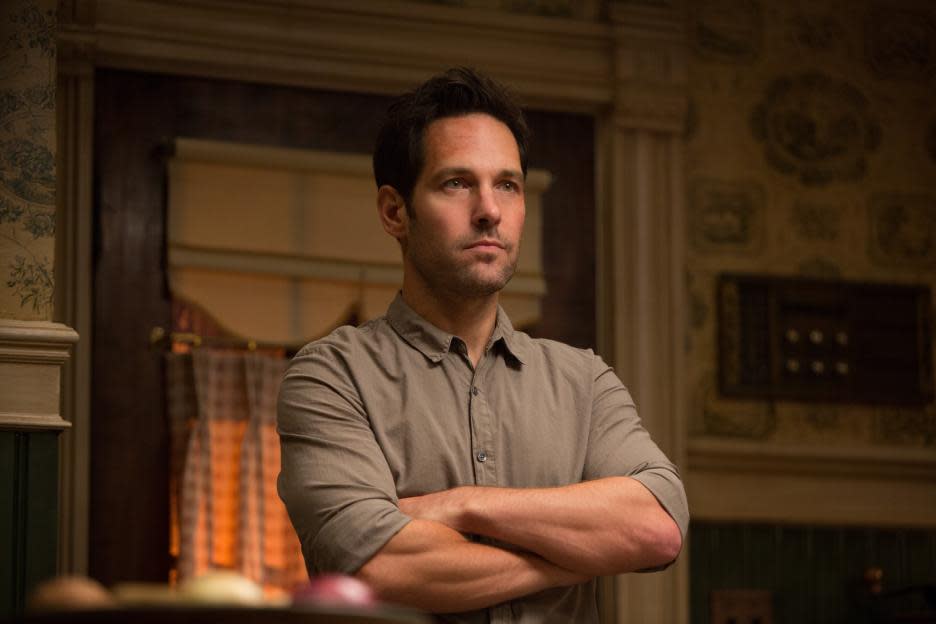
DEADLINE: Paul Rudd had some moments like that, even though they involved the other superheroes looking at his Ant-Man with a great deal of scorn. It helped the chemistry.
ANTHONY RUSSO: What Rudd did on a performance level there was fascinating. He came to the set and goes, ‘I can’t believe I’m here. I’m looking around at all of these actors who play all these amazing characters, and I feel like I got to pinch myself..’ That was perfectly in line with what his character was doing in the scene. It was kind of funny.
JOSEPH RUSSO: We improvised a lot of that scene with him where he meets Captain America. A lot of that was written on the morning, based on how he was feeling. That’s about having a penchant for experimentation, and putting things down on film. We won’t say no. We’ll put it down on camera, and we’ll go figure it out in the edit room. Why not do everything? We’ll have your back in the editing room. And the writers Christopher Markus and Stephen McFeely, who’ve written more Marvel films than anyone, they really understand the voices of thee characters. They are two of the best writers in big branded space right now.
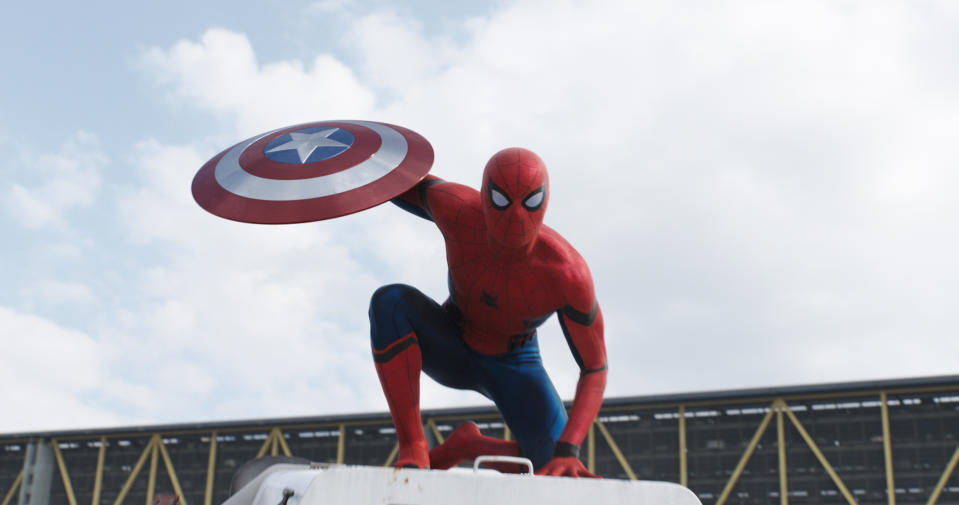
DEADLINE: Your Spider-Man was the one I recall reading in the comics, as a kid. There was a playfulness I just didn’t feel onscreen in the last two iterations. Your webslinger is very young, and not as defined by tragedy as the other iterations. Tom Holland had a lot of fun here.
ANTHONY RUSSO: That process was very specific.
JOSEPH RUSSO: I collected comics since I was 10. He was my favorite character, and obviously, when you’re enthralled with the mythology like that at a very young age, it imprints on you. When we got the opportunity to work with the character, I spent a lot of time reaching back into my childhood and thinking, what was the essence of the mythology that spoke to me? He was young, that he was relateable, he was me, he was vulnerable. And he was insecure in a way that fed the humor. He was a kid. This is so critical. He hadn’t been interpreted that way on screen yet, played by an actor who was very close to the age of a high school student. Tom Holland’s 19 years old. So that was critical, to cast someone so young he wouldn’t have a certain self-awareness. The humor comes from a sort of incongruous placement of him into this world. He stands in contrast to all these other experienced superheroes who are dealing with a very adult problem.
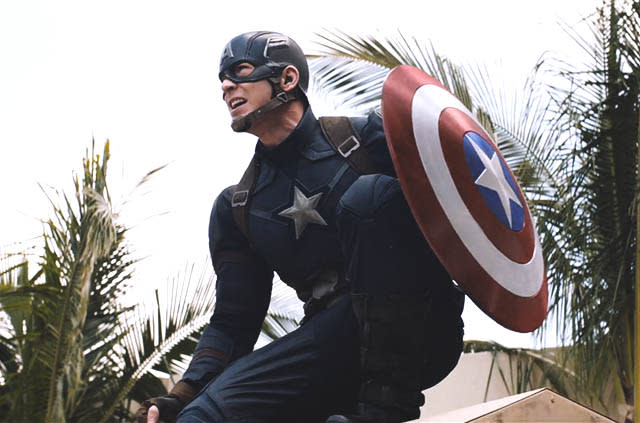
DEADLINE: You loved Spider-Man, growing up. How did you feel about Captain America?
JOSEPH RUSSO: I didn’t love Captain America as a kid. It was not one of my favorite comics. I found him a very flat character. A little vanilla. I used to imagine Steve McQueen in my head when I would read the comics because at least it gave it a little bit more edge for me. What we pitched to Kevin was, listen, if you’re going to continue with the story, the fact that this guy crashes in the ice and is going to wake up in modern times is a perfect story reset for us to go after a different tone, a different theme, a different dimensional approach to the character…a modern approach. Our buzz terms are always post-modern and deconstruct; how can you either make something post-modern, or how can you deconstruct it? That’s when we get interested in the concept.
ANTHONY RUSSO: To put it really crudely, the thing we would default to is just we want to butch Captain America way up, and we thought we had a narrative excuse to do it because he had been frozen for 70 years and wakes up in a world that he doesn’t recognize, and so he cannot be the same optimist that he was back in the day.
DEADLINE: You made him this pissed off 16-pound ball, rolling down the alley at the next collision, the bad guys falling like bowling pins.
ANTHONY RUSSO: That’s a cool analogy.
DEADLINE: Your action is just…frantic.
JOSEPH RUSSO: Action for us is a function of story. It either has to move the story forward, or it has to define the character in some way, or it’s vacuous. You can only handle about 30 seconds or a minute or vacuous action before your brain starts to wander. The action films we loved always either had a character in existential crisis or always had beautiful character defining moments, and there also was an artistry to the execution of the action that would bring camera work, performance, sound design, temporal editing, all into it. The French Connection, To Live and Die in L.A. 90 miles an hour in a car, somebody’s in the back seat having a panic attack. It ups the tension, not dissimilar to Gene Hackman almost hitting the woman, or the people crossing the street. The reason that chase scene in French Connection is so great is, it illustrates the insane drive behind the character to succeed at beating the villain. A dangerous drive, a reckless drive, which ultimately undoes him at the end of the film. So we approach action on two fronts. One is, what’s the storytelling front, and two, what’s the artistry of it? We like visceral impact. Michael Mann is a huge influence on us. We don’t hide that.
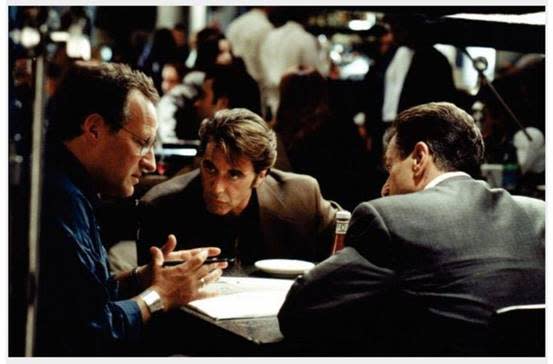
DEADLINE: What, in particular?
JOSEPH RUSSO: That bank heist in Heat is the greatest 10 minutes of action I’ve seen in 20 years of filmmaking. It’s character defining. It’s visceral. It’s intense. I literally feel like I’m in the middle of a heist. I sat in the theater, and when I walked out, I felt like I robbed a bank.
ANTHONY RUSSO: On Winter Soldier, for the causeway sequence where the Winter Soldier jumps onto the car, that’s what we were chasing.
JOSEPH RUSSO: Michael Mann’s bank heist. Limited dialogue. We did that eight and a half minute sequence in Winter Soldier and you could count the lines on two hands.
DEADLINE: How much does this movie plant seeds for the two Avengers movies you are making as your next major undertaking?
ANTHONY RUSSO: I will say that we had one big idea: if Infinity War is intended to be the culmination of the Marvel cinematic universe and this moment where they’re going to finally meet Thanos, which is the greatest threat that the universe has ever seen, then what can we do to set the stage for that in the most fun way? This was part of the reason we embraced Civil War. Is like, yeah, well, let’s shatter The Avengers before we get there. And make it fun to see if and how they come back.
JOSEPH RUSSO: That seemed a better story trajectory, to give them a long distance to travel. The other thing is, we knew we had to deconstruct. Because we’re fans as well of film making, and I’ll be the first guy at a midnight screening with my kid, too. I fu*king love movies, and I love big branded movies, and just from our own gut and our own reaction, clearly, it was becoming a saturated market. We felt like the smartest thing that we could do with the movie was to deconstruct the genre rather than to keep repeating that three-act structure where hero has a problem in the first act. Introduce villain. Hero and villain come into conflict in the second act. Third act, hero beats villain. We worked really hard to subvert that, with twists in the movie that are about subversion and playing with the fact that you are conditioned to believe that that’s where we’re going to go. And then we pull the rug out from under you.
DEADLINE: When do you start these Avengers films?
JOSEPH RUSSO: We already started them, a couple months ago. We had to. We start shooting in November, two movies back to back. So we need two scripts ASAP, and we probably started working on them six months ago.
DEADLINE: So you took advantage of shooting, while you had all those actors in costume?
JOSEPH RUSSO: Not in terms of shooting. Just story.
ANTHONY RUSSO: Just story, with Markus and McFeely, the writers. Hardcore conversations. As soon as we got into post on this movie, we gave ourselves a few weeks to transition and then we spent half days with the writers, and half in the edit room, for months. We’ll get the first draft of both scripts when this movie opens.
DEADLINE: This consecutive shoot trend started with The Lord of the Rings and it continues with Avatar and you guys. What’s the benefit of such a long ordeal?
ANTHONY RUSSO: It’s a very hard way to do it, but here’s the upside. You get to play with all these actors. It’s very hard to make that work financially as a studio, as a producer, to assemble that level of talent, and make them available for those movies. So it’s just that’s the way you have to work. It’s a hard way to work.
JOE RUSSO: Having a shorthand with the crew does create a continuity of vision and efficiency which is invaluable when you’re doing stuff of this scale. Any misspent dollar is a huge waste and a huge mistake.
DEADLINE: I just mentioned Peter Jackson and James Cameron, guys who’ve done multiple installments of big popcorn VFX movies. That’s rarified company. How do two brothers from Cleveland who started out making art films becomes the new Kings of Marvel?
JOSEPH RUSSO: It was a bit of a lottery ticket thing, without question.
ANTHONY RUSSO: We grew up film fans, we enjoyed movies with our dad, and we would watch The Late Show movie.
JOSEPH RUSSO: But our aesthetic growing up came out of the fact that we had a CinemaTech around the corner from us. So we grew up on foreign films, art house films. Truffaut was a huge influence on us. We liked experimentation in filmmaking. We liked to be surprised.
ANTHONY RUSSO: The Belgian film, Man Bites Dog, that was a big favorite of ours.
JOSEPH RUSSO: That was a big influence.
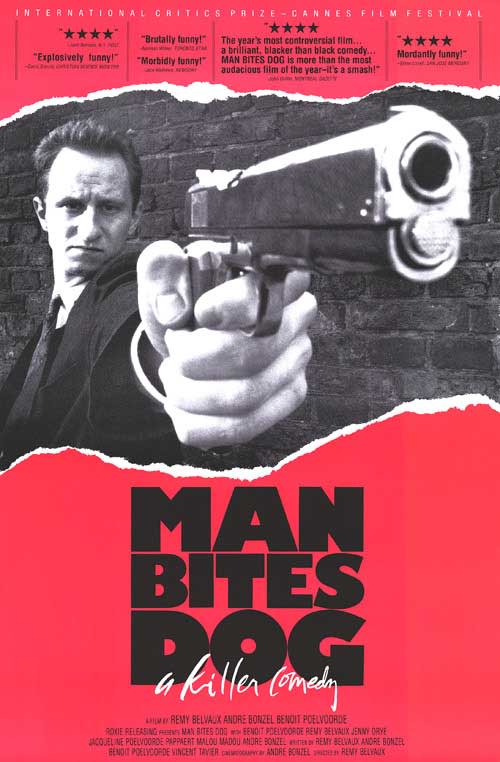
DEADLINE: The one where you went on this entertaining journey with a serial killer and then felt like an accomplice when he butchered a pregnant woman? I remember someone asking me to see that film, and being furious at being taken for that ride.
JOSEPH RUSSO: It’s a very dark…
ANTHONY RUSSO: This may surprise you, but that movie was our major stylistic reference for Arrested Development.
DEADLINE: Shut up.
ANTHONY RUSSO: It’s true.
JOSEPH RUSSO: It’s that vérité docu style approach that was a very dark comedy.
ANTHONY RUSSO: And there was an absurdist element. Even though the move was…at the heart, there was something absurd about it, right, at some level. It was so crazy, right?
DEADLINE: I do recall a moment where the killer runs into another killer with a camera crew, kills that killer and his crew, and is disappointed when his own crew tells them they used Beta equipment that wouldn’t work in their camera.
JOSEPH RUSSO: Exactly.
ANTHONY RUSSO: That was the kind of stuff that tickled us to death.
JOSEPH RUSSO: Lars von Trier was another we loved.
ANTHONY RUSSO: And all the Italian films. We developed a split personality; we’d geek out at the Cinemateque, but we recognized the movies you end up talking to everybody else about the most are the movies everybody loves, the big movies. So we saw those too.
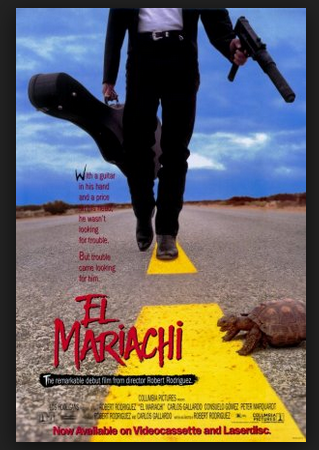
DEADLINE: How did you break in?
ANTHONY RUSSO: Joe was in acting school, I was in law school just because I didn’t know what to do. Even though Joe nagged me to go to directing school, but I didn’t see the road into that world. We started a sketch comedy troupe together, which is where the name Gozie Agbo came from. Then Robert Rodriguez put out that book about how he made El Mariachi, and that you can make a movie for 7,000 dollars. A light bulb went off, and we thought, let’s try to make a movie. That took us six months.
JOSEPH RUSSO: We knew nothing about writing a script. We bought some how-to books, studied them, and wrote a script. But our influences were all radical filmmakers, and so the film itself was extremely radical, non-linear storytelling. It was called Pieces. Never been released, and part of our lack of experience or understanding of the film business, we put, like, a million dollars of music in the movie, which was edited very specifically to it. We didn’t have a million dollars to secure the music.
ANTHONY RUSSO: The money we did get came through credit cards. It probably took us three years to make the movie. We’d make a little bit, go back to work. It would sit for a while. Our family helped a little, but we carried debt from that movie for 10 years.
JOSEPH RUSSO: The interest on those cards killed us. I mean, who gives a credit card to 21 or 22 year olds? It’s going to kill them. The rates were insane, and so we bought some books on how to make movies.
ANTHONY RUSSO: We went to find everybody in Cleveland that we could who knew anything about making movies and would talk with them, and ask them questions, and show them what we were trying to do.
DEADLINE: So how does a movie that has never been released become a career break?
ANTHONY RUSSO: Complete happenstance. We took the movie, while we were finishing it, to the IFFM in New York. You pay a fee, and you get to show your movie at this market. A friend who helped us produce the movie worked the graveyard shift at a printing company and printed up all these flyers, and posters, and mailers, and everything we did. We plastered New York, all the production companies. The screening happens, and it’s packed. They tell you, people are looking for movies to buy; don’t get demoralized if people start to walk out. They’ve just decided the your movie’s not for them and they’re on to the next screening.
DEADLINE: Uh oh.
ANTHONY RUSSO: Joe was in LA at the time, his wife was having a baby. I’m standing at the back of the theater. The movie starts. People start streaming out. By the end of the movie, a quarter of the theater is left, and then everybody files out. Nobody says anything except one person. ‘Hey, my name is John Fitzgerald, and I’m one of the founders of the Slamdance Film Festival. I liked your movie. I think maybe you guys should apply.’ It was all we had. We got in, and basically the same thing happened. We plaster Park City.
JOSEPH RUSSO: Big Italian family, running around putting up posters everywhere.
ANTHONY RUSSO: We had our Uncle Charlie, took over a bar on Main Street, where he cooked his linguini with clam sauce. Festival ends. Crickets. Nobody is interested. A week later, we get a call. Steven Soderbergh had a movie called Schizopolis that opened in Slamdance.
JOSEPH RUSSO: He had had a falling out with Redford. He was the Sundance darling after sex, lies & videotape. Which was historic.
ANTHONY RUSSO: I don’t know if he talks about it, but yeah.
JOSEPH RUSSO: Well it’s on record, that it was why he took the film to Slamdance after being the ultimate Sundance Festival success story.
ANTHONY RUSSO: Someone said to him, you should see this other movie. Pieces was similar to what he did in Schizopolis.
JOSEPH RUSSO: If you see Schizopolis, you have a sense of what Pieces is. Non-linear radical structure, absurdist.
ANTHONY RUSSO: It’s aware of itself as a movie all the time. At one point, we cut to the actual script.
JOSEPH RUSSO: So I’m cooking mac and cheese at UCLA housing with my brand new baby and my wife, with no idea what we were going to do. We’re burdened with all this credit card debt. We’re building up student loan debt because we’re both in film school by that time, me at UCLA, him at Columbia. We use their equipment to help finish the movie. Then phone rings. I answer, and it’s a guy who says, hello, my name’s Steven Soderbergh, and I thought it was one of my buddies from film school, fu*king with me. He said he wanted to sit down and have lunch, that he saw our movie. Everything in our careers to this point had been a shoestring save, even sitting down with Soderbergh and fostering a relationship. Richard Arlook once told us when we got to Hollywood, it’s going to take every drop of blood in your body to succeed in this business. That adage has held true by all accounts for the last 20 years of our career. Soderbergh tells us…
ANTHONY RUSSO: I’d like to help you guys get another movie made.
JOSEPH RUSSO: He actually wrote a check to help us finish Pieces so that we’d have a nice copy to show people. He said, I really love what you’re playing with in this film. It was a genre-bending movie. It was about a heist, but completely absurdist in the style of a Godard film. He said, go to work writing some scripts, let’s come up with a piece of material. What was fascinating about meeting Soderbergh at that time, not only were we lucky enough that he responded to the movie, but we were lucky enough to meet him at a point in his career where he was transitioning from an art house filmmaker to a commercial filmmaker. By necessity, not out of choice. He had told us at that lunch he was going to go do this movie called Out of Sight. At the time, George Clooney was coming from television, and it seemed like a risky proposition. It turned out to be one of, if not his best movie.
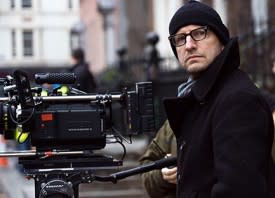
ANTHONY RUSSO
: He was such a god to us that we even questioned him at the time. Why are you going to do that? He said, because everybody knows my movies don’t make any money, and I can’t get stuff made anymore. He was pinched. You could see it in him.
JOSEPH RUSSO: That became a real lesson for us in the business. Two guys who made this radical movie, knew very little about the business sitting there with a guy like Steven Soderbergh. Going, holy shit, Steven Soderbergh can’t get financing, and we started thinking about that. It was a real life lesson for us.
ANTHONY RUSSO: Because in our heads, prior to that moment, you’re like, who the hell wouldn’t want to make a Steven Soderbergh movie? Well, obviously, somebody who just has money and is interested in protecting their money. We understood. We wrote three scripts.
JOSEPH RUSSO: We loved the sweeping gangster epic set in Cleveland in the late ‘70s, a mob war between the Italian mafia, the Jewish mafia, and the Irish mafia. Big movie. Expensive movie. Steven loved the script but felt it would be too hard to get it financed as our first film.
ANTHONY RUSSO: Especially with us using Pieces as our sample…
JOSEPH RUSSO: We also worked on a remake of Big Deal On Madonna Street, this classic Italian comedy. That became the script called Welcome to Collinwood, which Steven read and it made him laugh a lot. He said, this is cheaper, easier. I can get this made. It took two years to get the financing and cast. By then, Steven and George had such a successful relationship on Out of Sight, they formed Section Eight at Warner Bros. Anthony and I literally lived on their couch in that office. They got us a coffee table with a phone that we waited to ring from whichever agent we submitted the script to, hoping for their client. Steven finally got Warner Bros to step in after we lost financing two or three times to some more specious foreign financiers.
ANTHONY RUSSO: There was an actor strike at the time, and it was very complicated. So, finally, as a desperate solution, Soderbergh, who had influence because of Ocean’s Eleven, said, as a favor to me, I want you to make Welcome to Collinwood.
JOSEPH RUSSO: And they said, only if George takes a part in the movie. And he did. Now, we were guys who loved Star Wars, and I saw Empire Strikes Back six times in a row in a theater one day, but we were more interested in succeeding in art house filmmaking. So we shot that movie in an absurdist, extreme style, not a good match for Warner Bros. It did terribly at the box office.
ANTHONY RUSSO: It cost $7 million. They put it in 12 theaters. It made about $300,000. Total disaster.
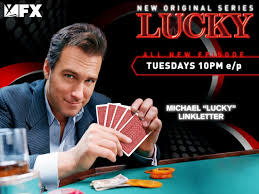
DEADLINE: Sounds like a career ender.
JOSEPH RUSSO: Luckily, the day before the movie came out, Kevin Reilly, who took over FX just when The Sopranos was changing television. He hired us for this series that drew its roots from independent cinema. It was called Lucky, a show about a degenerate gambler who won the World Series of Poker the year before, lost all the money and his wife committed suicide. John Corbett, Billy Gardell and Craig Robinson were the stars.It was a single camera, half hour comedy a little ahead of its curve in terms of darkness. The pilot has this guy bottoming out, gambling again so he can pay his wife’s parents back for the cost of his funeral. The show didn’t work, ultimately, but the pilot became an industry favorite, a calling card. Everyone wanted to take meetings.
ANTHONY RUSSO: Actually, the tone of the pilot was not dissimilar to Civil War in that there were high comedic moments, married to real pathos. There’s an absurdist comedy gag where one of the lead characters, Gardell, repeatedly gets hit by cars in order to collect money from the drivers, but shot extremely physical. The stuntman was just throwing himself in front of moving cars. Ron Howard saw all this and that led to Arrested Development and all this other stuff. We did commercials, we did all these pilots.
JOSEPH RUSSO: Eventually, we paid off those credit card bills.
ANTHONY RUSSO: We’re always driven by diversification, and we learned that from Soderbergh. So many life lessons were seeded in us very early by Steven. We owe him everything. Not only did he discover us, but he implanted in us the seeds that allowed us to get to where we are now in the business. We were watching him so closely at such a sensitive part of his career. We were taking notes.
DEADLINE: Let’s cast you in the Soderbergh role. What would you tell a wannabe trying to find a way in?
JOSEPH RUSSO: Look at the leveling of the playing field. The country club access of the ‘80s and ‘90s has disappeared, and the power’s now shifting to the people. You don’t need the infrastructure and the cash flow of a studio to find success. Some of these Vine kids have 10 million followers, and monetize that. Studios are surviving through branded IP. TV is surviving through cash-rich companies who can afford to counter program against that branded IP like Netflix, but behind that is this monster, this sleeping giant…
ANTHONY RUSSO: What Joe and I love about the film industry, it’s like the wild West. We’re two guys who grew up a million miles away from the film business; it doesn’t matter where you come from, or where you go to school. All that matters is, can you find a way to practice the craft, and express yourself in a way that people respond to. It’s so simple and pure. What we are most excited by, going forward, is, there are more options than ever, to do that. Because of how technology has developed, through the iPhone, the internet. It’s easier than ever to find weird ways to express yourself through the moving image.
JOSEPH RUSSO: There were two quotes that we cut out of books and put on our wall. One was a quote from Friedkin, who said, once you stop riding the subways and learning how to play tennis, you’re done. The other was from Coppola, from the Cannes festival talking about Apocalypse Now. He was in that experimental drug phase, going on a rant to the press about filmmaking and experimentation. He said, one day, a little fat girl from Ohio is going to pick up a Super 8 camera and change the way we think about movies.
DEADLINE: You wanted to be that little fat girl from Ohio?
ANTHONY RUSSO: Well, that was the name of our first company, so yes. We dedicated the name to that girl.
JOE RUSSO: Well, I’m using those quotes in terms of motivating young filmmakers. Pick up your Super8 camera, and try to change the way stories are told. They’re doing it right now, with their iPhones, or their consumer grade Best Buy or Amazon-bought video cameras, and they are changing the form. That’s the rallying cry. Look what the future holds, look what’s in front of you. Grab it and just start telling stories, and turn it into your own language.
Related stories
Kevin Feige On 'Captain America: Civil War' And All Things Marvel - Deadline Q&A
'Captain America: Civil War' Zooming Past $300M Overseas Today - Intl Box Office
Get more from Deadline.com: Follow us on Twitter, Facebook, Newsletter

